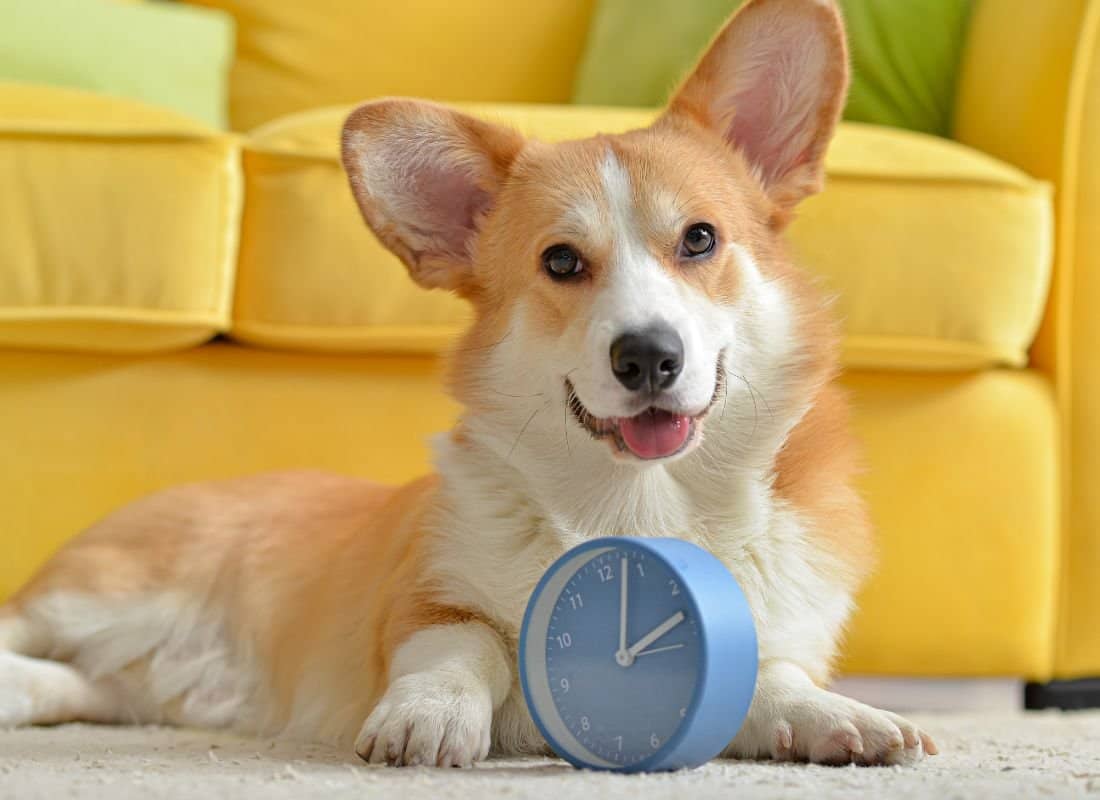How Dogs Tell Time: The Science Behind Your Pet’s Internal Clock

Have you ever wondered how your dog seems to know exactly when it’s dinner time, or why they’re waiting expectantly by the door minutes before you usually return home? I always say to my husband that our sweet rescue dog, Mr Fitch, must have a clock or watch he’s hiding from us because he always knows what time it is! As it turns out, our four-legged furry kids aren’t just good at routines – they actually have a sophisticated way of perceiving time that’s quite different from ours.
Recent scientific research has revealed something extraordinary: dogs can literally smell time passing. As scents in the house dissipate throughout the day, your dog can track how long you’ve been gone by how strong your lingering scent is. Dr. Alexandra Horowitz, a cognitive scientist specializing in dog behavior, explains that this “scent clock” helps dogs understand the passage of time in a way that’s completely foreign to us as humans.
But that’s just the beginning of your dog’s intelligence. Dogs possess what scientists call a “circadian rhythm” – an internal clock that helps them anticipate daily events. However, unlike humans who use visual cues like watching the clock or noticing the sun’s position, dogs rely on a complex combination of sensory information. They integrate everything from their hunger levels and hormonal changes to environmental cues like neighborhood sounds and temperature fluctuations throughout the day.
The way dogs experience time is also fundamentally different from humans. While we think in terms of past, present, and future, dogs live primarily in the present moment, with their sense of time more closely tied to their immediate experiences and established routines. This is why your dog doesn’t hold grudges (despite what it might seem like when you return from the vet), but can become extremely accurate at predicting regular events like walks or feeding times.
Understanding how dogs perceive time can dramatically improve your relationship with your super amazing canine companion. For instance, if your dog shows anxiety when you leave, they’re not just being dramatic – their sense of time is genuinely different from ours. A five-hour absence might feel much longer to them due to how they process the degradation of your scent. This knowledge has practical applications: leaving an unwashed piece of your clothing near their bed can help them feel more secure, as your scent remains strong and steady rather than slowly fading throughout the day.
Perhaps most fascinating is how dogs adapt their time perception to match their humans’ schedules. Research from the University of Helsinki suggests that dogs can learn to anticipate events not just based on set intervals, but by associating them with specific sequences of activities. For example, your dog might start getting excited for their walk not just at 6 PM, but when they see you changing into your exercise clothes or reaching for their leash. I remember when our beagle, Reggie, was alive, he would begin to stress when my husband and I simple spoke about going somewhere the next day. Then, when he woke up the next day, Reggie would pace and cry until he figured out he was going with us!
This temporal intelligence extends beyond daily routines. Dogs have demonstrated the ability to respond to different verbal time cues (“wait” versus “stay,” for example) and adjust their expectations accordingly. They can learn that certain activities happen on specific days of the week, like weekend hikes or visits from the dog walker every Wednesday.
For dog parent, this understanding opens up new possibilities for training and bonding. By respecting and working with your dog’s natural time perception, you can create more effective routines and reduce anxiety-related behaviors. Something as simple as maintaining consistent timing for meals and walks can help your dog feel more secure and better understand their daily schedule.
The next time you marvel at how your dog seems to know exactly when something is about to happen, remember that they’re not just creatures of habit – they’re sophisticated timekeepers using a complex system of sensory information that we’re only beginning to understand. Their perception of time might be different from ours, but it’s no less remarkable.

Leave a Reply
You must be logged in to post a comment.

Leave a Comment